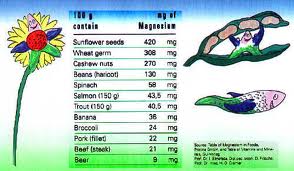The USA has the highest rate of dairy consumption, yet it also has the highest rate of osteoporosis. Does this not seem preposterous? It was this observation that got me reanalyzing some metabolic pathways involving calcium. During this research, I also noticed a high percentage of my clients that report calcium supplementation recommended by their doctors. I certainly agree that calcium supplementation has its place in our diet, but only if calcium sources are limited. How I arrived at this premise is described here, and it involves a trace mineral called Magnesium.
Magnesium, as micro as it is, has a major role in bone health. One of the most relevant to, is that magnesium controls calcium metabolism. In fact, there is a very fine line between calcium overdose and magnesium deficiency. Why? Calcium relies on magnesium to be metabolized. This means that too much calcium or calcium toxicity, as it is known, can further deplete magnesium by pulling it away from its regular function, in order to be metabolized. Excess magnesium does not build up in the body. What is not needed is eliminated. Magnesium can correct a calcium deficiency as well as a magnesium deficiency, BUT excess calcium depletes magnesium. Moreover, excess calcium is detrimental to bone health and a myriad of other disorders (eg. calcium deposits cause kidney stones, gallstones, arthritis, etc.) Logically, this would mean a supplementation for magnesium would be more relevant than a supplement for calcium.
Contrary to customary belief, magnesium deficiency is more common than calcium deficiency, even amongst individuals that are disciplined about supplementation. Part of the problem is that calcium supplementation seems to be prioritized, and if there is excess calcium it will exhaust the magnesium availability. As mentioned, excess calcium is not excreted, and thus a toxicity of calcium is more likely than a deficiency, especially if the need for supplementation is avoidable through diet. Funnily enough, the symptoms of calcium build up, kidney stones, gallstones and arthritis, seemed to be relieved when a magnesium supplement is taken.
Other Functions of Magnesium
Magnesium is responsible for hundreds of metabolic pathways. So besides its control of calcium absorption, it enables specific digestive functions, muscle function, regular heart beat, new cell formation, and nervous system stimulation. Based on these few mentionables alone, it is evident that a magnesium deficiency can disrupt balance in bodily function.
As a sports dietitian, I cannot forget to mention that magnesium regulates the other electrolytes, potassium and sodium as well. From personal experience, most athletes are inclined to consume products high in potassium and sodium to improve performance, prevent cramps, and prevent serious sports mishaps, yet magnesium is hardly mentioned. Did you know, without magnesium, the other electrolyte functions are inadequate? So in a sense, magnesium, is a limiting factor to any electrolyte pathway, and is therefore almost more important than the ones it regulates. Furthermore, magnesium has a key role in overall energy levels, as it is responsible for individual cell formation. Thus a deficiency will not only result in chronic fatigue, but it may also contribute to “hitting the wall” during training and/or racing.
Magnesium and calcium work together to control muscle movement, and this includes the heart (as the heart is a muscle). Magnesium deficiency or excess calcium thus results in cramps, similar to potassium or sodium imbalances. Irregular heartbeats are also a symptom of a magnesium deficiency. Did you know, one of the first lines of treatment for a heart attack, is a shot of magnesium? It should now make sense as to why that is appropriate.
What depletes and/or enhances Magnesium
It has already been observed that an excess of calcium depletes magnesium. This is particularly evident when calcium is supplemented unnecessarily. Magnesium is water soluble and is thus best assimilated into the body when dissolved in water. It is also best taken or eaten, so to speak, without a source of calcium simultaneously. The most natural and bioavailable sources of magnesium come from food. Food sources high in magnesium include: dried apricots, avocadoes, whole grains, dark leafy greens (spinach, kale, etc.), legumes (peas and lentils), and nuts (best sources are almonds and cashews). Because magnesium is water soluble, and any unused excess is easily excreted, taking a supplement is not a bad idea. Particularly if some of the above mentioned symptoms are experienced.
In Summary
Although there is a push to get enough calcium, it is important to understand, more is not necessarily better since magnesium is depleted by an excess of calcium. Magnesium has a major role not only in human metabolism, energy, heart health, and bone health, but also in sports performance. It plays a role in hundreds of metabolic pathways, and if these function efficiently, it puts less strain on the body’s internal stress. Without Magnesium, many minerals and nutrient functionality will be limited. So many months or even years of chronic suffering can easily be eliminated if the bottom line is a magnesium deficiency. It is relatively harmless to supplement (remembering too, that more is not necessarily better, but appropriate supplementation can be miraculous). It sure is worth a try.




did you know that Magnesium also can help relieve migranes. I have been taking 750 mg a day for the past 10 years and have completly halted all major migranes. occasionally due to stress one will start but if I increase my dosage to 1000 mg it has stopped it into going into a full blown attack
Avril Lavigne has found herself on the receiving end of criticism, following the release of her latest music video. The 29-year-old pop star released the music video for her single “Hello Kitty” on Tuesday but the clip was taken down almost as quickly as it was